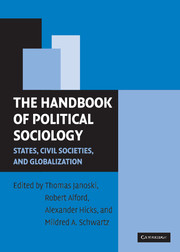Book contents
- Frontmatter
- Contents
- Preface
- Contributors
- Political Sociology in the New Millenium
- PART I THEORIES OF POLITICAL SOCIOLOGY
- PART II CIVIL SOCIETY: THE ROOTS AND PROCESSES OF POLITICAL ACTION
- PART III THE STATE AND ITS MANIFESTATIONS
- PART IV STATE POLICY AND INNOVATIONS
- PART V GLOBALIZATION AND POLITICAL SOCIOLOGY
- References
- Name Index
- Subject Index
Political Sociology in the New Millenium
Published online by Cambridge University Press: 05 June 2012
- Frontmatter
- Contents
- Preface
- Contributors
- Political Sociology in the New Millenium
- PART I THEORIES OF POLITICAL SOCIOLOGY
- PART II CIVIL SOCIETY: THE ROOTS AND PROCESSES OF POLITICAL ACTION
- PART III THE STATE AND ITS MANIFESTATIONS
- PART IV STATE POLICY AND INNOVATIONS
- PART V GLOBALIZATION AND POLITICAL SOCIOLOGY
- References
- Name Index
- Subject Index
Summary
Although modern political sociology has existed for more than a century, it came into its own during the decades bridging the victory at the end of World War II and the anti-Vietnam War movement. Especially important in setting the direction for political research with a distinctive focus on “the social bases of politics” was Seymour Martin Lipset's Political Man (1960), published in twenty countries and deemed a “citation classic” by the Social Science Citation Index. The transformative potentials of the social bases of politics were redirected away from the pluralist theoretical tradition by William G. Domhoff's Who Rules America? (1967), which stimulated interest in capitalist power; William Gamson's The Strategy of Social Protest (1975), which expanded attention to the popular bases of power beyond interest groups to social movements; and James Petras and Maurice Zeitlin's Latin America: Reform or Revolution (1967), which excited new interest in the politics of labor movements. The 1980s' ascent of state-centric institutionalism registered a major impact on political sociology with its Bringing the State Back In, edited by Peter Evans, Dietrich Rueschemeyer, and Theda Skocpol (1985). The works of these times had a common focus on the societal determination of political processes and outcomes and on how state structures cause varied outcomes in different countries.
- Type
- Chapter
- Information
- The Handbook of Political SociologyStates, Civil Societies, and Globalization, pp. 1 - 30Publisher: Cambridge University PressPrint publication year: 2003
- 2
- Cited by

